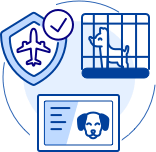Pet travel from the United States to Japan
Welcome! This page will guide you through the rules and requirements for traveling internationally with your pet.
Before You Start the Process
Find a USDA-Accredited Veterinarian
With help from a USDA-accredited veterinarian, you can learn more about your destination country's entry requirements for pets, including any needed vaccinations, tests, or treatments. We recommend creating a schedule to make sure you meet all requirements within the specified timeframe.
Gather This Information for Your USDA-Accredited Veterinarian
- The type of pet traveling
- The destination country
- If applicable, countries where your pet will stop (for customs clearance or upon leaving the airport or seaport) on the way to the destination country
- The date of departure from the United States
- Whether the pet will be traveling alone, as cargo, or with a person in the cabin of the plane
- Note: If you're traveling with a pet bird or exotic animal, you may need to work with additional agencies, such as the U.S. Fish and Wildlife Service (1.41 MB) and Centers for Disease Control and Prevention.
Read These Resources
- Pet Travel Guidance for Pets Traveling to Another Country From the United States
- In Spanish (En Español): Guía de viaje para mascotas que viajan a otro país desde Estados Unidos
- In Chinese (用中文(表達): 宠物出国旅行指南
- Frequently Asked Questions About Traveling With Your Pet
Travel Requirements Based on Pet Type
For all pets other than those listed* below to Japan, USDA Accredited Veterinarians may issue health certificates electronically through the online Veterinary Export Health Certification System (VEHCS). These certificates will be digitally endorsed by APHIS once received in the system and available for printing by the USDA Accredited Veterinarian once the endorsement is completed by APHIS. An APHIS-endorsed, printed paper copy must accompany the shipment.
Health certificates for the types of pets listed* below, may be submitted by the USDA Accredited Veterinarian through VEHCS; however, the APHIS Veterinary Medical Officer's ink (wet) signature with the application of the APHIS embossed seal must appear on the health certificate. Certificates received by APHIS through the VEHCS system will be printed and endorsed in our offices, and the hard copy will be returned when complete. This APHIS-endorsed and embossed paper copy must accompany the shipment.
* Pet Birds
Pet Ferrets
Taking Dogs and Cats into Japan from Hawaii or Guam
If you are traveling from Hawaii or Guam to Japan, visit Japan’s Animal Quarantine Service Website for more information.
The importer must provide advance notification of the animal to be imported to the Animal Quarantine Service (AQS) with jurisdiction over the intended air or seaport of arrival at least 40 days prior to arrival in Japan by fax or mail.
Dogs and cats must be individually identified by an ISO compliant microchip. If the animal is not fitted with an ISO compliant (11784 and 11785) microchip, the importer must bring a microchip reader with the pet.
Dogs and cats must be inspected by a USDA Accredited Veterinarian and confirmed free of clinical signs of infectious disease including rabies and leptospirosis (for dogs) prior to departure.
- Export Health Certificate (Form AB): Form AB may only be used for U.S. origin pet dogs and cats traveling to Japan from the state of Hawaii or the U.S. territory of Guam. Form AB contains the information required for both the owner declaration and health certificate. The exporter will need to have this form endorsed by APHIS-VS.
NOTE: The “Clinical Inspection by Veterinarian” and the “Certification by Official Government Veterinarian” attestation sections of the health certificate should be completed by the issuing USDA Accredited Veterinarian. When completing these sections, note that Hawaii and Guam are considered “Rabies-Free Designated Regions” of the United States. As such, when Form AB refers to the “exporting county” this should be interpreted as either the state of Hawaii or the territory of Guam, and not the entire United States. For instance, when the statement says “The animal has been continuously resident in the exporting country for at least 180 days immediately before shipment to Japan, or since its birth,” this means the animal has been a resident of Hawaii/Guam for the last 180 days or since birth.
The “Endorsement by Official Government Veterinarian” section should be completed by the USDA-APHIS-VS endorsing Veterinary Medical Officer.
Other Options for Acceptable Health Certificates Include:
Using Form AB above fulfills all health certificate requirements for U.S. pet dogs and cats from Hawaii/Guam to Japan. However, the exporter may choose to use the following other options instead of the Form AB:
International Health Certificate (APHIS Form 7001): The APHIS Form 7001 can be obtained from the issuing USDA accredited veterinarian. This form can be used, as a stand-alone entity, providing that it includes all the information required on both Form AB and the Exporter's declaration (Form A).
OR
International Health Certificate (APHIS Form 7001) & Exporter's declaration (Form A): The APHIS Form 7001 can be obtained from the issuing USDA accredited veterinarian. The APHIS Form 7001 must contain all the information required on Form AB. The traveler must prepare the Exporter’s Declaration (Form A) with the assistance of their USDA accredited veterinarian. Both the Exporter’s Declaration (Form A) and the APHIS Form 7001 need to be endorsed by APHIS-VS, and both must accompany the shipment.
Japan recommends the following measures for bringing pets into Japan.
Immunization: Japan recommends that the following immunizations be given to dogs and cats that are 91 days old or older 30 days prior to their arrival in Japan (within the vaccine immunization effectiveness period).
- Dogs: distemper, contagious hepatitis (Adenovirus type II acceptable), parvovirus infectious disease trivalent vaccine (parainfluenza, leptospirosis, coronavirus)
- Cats: feline viral rhinotracheitis, feline calicivirus, feline panleukopenia trivalent vaccine
Parasite treatment: Japan recommends the following parasite treatments before departure (no more than 4 days before boarding):
- External parasites: Treat with medicines effective against mites and fleas, and at the time of export have a clinical inspection to confirm that the animal is free from these parasites.
- Internal parasites: administer medicine effective against nematodes and tapeworms.
Visit Japan’s AQS Website for more information on taking your dog or cat to Japan
Taking Dogs and Cats into Japan from the United States (all other states)
Pets (dogs and cats) may be imported into Japan with a quarantine of less than 12 hours if the following conditions are met.
For a step-by-step guide and additional information on the process, please read the "Guide to importing dogs and cats into Japan from Non-designated regions" published by the Japanese import authority.
Also, refer to this HELPFUL FLOWCHART.
The importer must provide advance notification of the animal to be imported to the Animal Quarantine Service (AQS) with jurisdiction over the intended air or seaport of arrival at least 40 days prior to arrival in Japan by fax or mail.
Dogs and cats must be individually identified by an ISO compliant microchip. If the animal is not fitted with an ISO compliant (11784 and 11785) microchip, the importer must bring a microchip reader with the pet.
The pet must be microchipped on the day of or before the 1st vaccination.
Exception: Microchip implantation can occur on the day of or before the 2nd vaccination when the export health certificate, endorsed by APHIS, shows that:
- the 1st vaccination was administered prior to microchip implantation, and
- the animal had a rabies antibody titer of at least 0.5 IU/ml on a serum sample collected on the day of administration of the 2nd vaccination.
Dogs and cats must be vaccinated against rabies twice or more after the microchip implanting.
First rabies vaccination
- At least 91days old at the time of vaccination(the date of birth is counted as day 0)
- After the microchip implanting(including the same day of implanting)
Second rabies vaccination
- More than 30 days apart from the first vaccination (the date of the first one is counted as day 0)
- Within the effective period (duration of immunity) of the first vaccination
Dogs and cats must be evaluated for serum rabies antibody level. The animal must have been vaccinated for rabies in accordance with section 3 above.
Animals microchipped before or on the day of the 1st vaccination, the serum sample may be collected on the date of 2nd vaccination or any day until the end of the effective period of the 2nd vaccination.
The rabies titer test must be carried out at a laboratory approved by the Minister of Agriculture, Forestry and Fisheries of Japan. The results of the rabies titer test must be greater than or equal to 0.5 IU/ml. The result of rabies titer test is valid for two years from the date of sampling. The laboratory results must be originals (no USDA endorsement needed) or copies with USDA endorsement. No report is needed if the animal is a returning pet that has a valid “Export Quarantine Certificate” with lab results listed within the last two years.
Approved Laboratories:
Dogs and cats are required to undergo a wait of at least 180 days between the date the sample is collected for the rabies titer test and the date the animal arrives in Japan. If 180 days have not passed before the animal’s arrival in Japan, the animal will be quarantined in an AQS facility to make up the number of days remaining in the 180-day wait period. Antibody levels are measured in order to confirm whether or not the animal has developed immunity to rabies. The reason for the wait is to make sure that the animal has not contracted rabies prior to developing immunity to it as a result of immunization, 180 days corresponds to the incubation period for the disease.
Dogs and cats must be inspected by a USDA Accredited Veterinarian and confirmed free of clinical signs of infectious disease including rabies and leptospirosis (for dogs) prior to departure. The traveler needs an Exporter’s Declaration and an Export Health Certificate.
- Health Certificate for dogs and cats to Japan (Form AC): Form AC contains the information required for both the owner declaration and health certificate. This document can be used to fulfill both requirements. The exporter will need to have this form endorsed by APHIS-VS.
Other Options for Acceptable Health Certificates Include:
Using Form AC above fulfills all health certificate requirements for U.S. pet dogs and cats to Japan. However, the exporter may choose to use any of the following other options instead of the Form AC:
- Exporter's declaration (Form A): The traveler needs to prepare the Exporter’s Declaration (Form A) with the assistance of their USDA accredited veterinarian. This form needs to be endorsed by APHIS-VS. This form must be accompanied by a Form C.
- Export health certificate (Form C): Form C is completed by the issuing USDA accredited veterinarian. The exporter will need to have this form endorsed by APHIS-VS. This form must be accompanied by a Form A.
- International Health Certificate (APHIS Form 7001): Another health certificate option is the APHIS Form 7001 which can be obtained from the issuing accredited veterinarian. This form must contain all the information required on Form C, must be accompanied by a Form A, and needs to be endorsed by APHIS-VS.
Military Personnel Options:
- Active duty military personnel and their families may use a valid health certificate for dogs and cats only issued by a military veterinarian without APHIS endorsement.
- Retired military personnel and their families: Japan requires APHIS endorsement of a valid health certificate. APHIS VS may endorse health certificates for pet dogs and cats for military personnel, when they meet the importing requirements of Japan on an APHIS Form 7001, Japan’s Export health certificate (Form C), MDJ 2209 Form or other suitable health certificate format.
Japan recommends the following measures for bringing pets into Japan.
Immunization: Japan recommends that the following immunizations be given to dogs and cats that are 91 days old or older 30 days prior to their arrival in Japan (within the vaccine immunization effectiveness period).
- Dogs: distemper, contagious hepatitis (Adenovirus type II acceptable), parvovirus infectious disease trivalent vaccine (parainfluenza, leptospirosis, coronavirus)
- Cats: feline viral rhinotracheitis, feline calicivirus, feline panleukopenia trivalent vaccine
Parasite treatment: Japan recommends the following parasite treatments before departure (no more than 4 days before boarding):
- External parasites: Treat with medicines effective against mites and fleas, and at the time of export have a clinical inspection to confirm that the animal is free from these parasites.
- Internal parasites: administer medicine effective against nematodes and tapeworms.
Visit Japan’s AQS Website for more information on taking your dog or cat to Japan
Pet birds must be quarantined (isolated) in a facility that prevents free-entry of mosquitoes for at least 21 days before travel. Examples of acceptable facilities include:
- Home where unscreened windows are kept closed and doors are only opened for entry and exit.
- An outdoor cage/ area with sealing doors and mosquito-proof screening.
The requirements for traveling with your pet are described in the below health certificate. APHIS endorsement of the health certificate is required after it has been issued by a USDA Accredited Veterinarian.
Japan requires that birds originate from a region/zone free of HPAI and LPAI. Please visit the Japan MHLW website for additional information on restricted regions/zones.
Please visit the Japan AQS website for additional requirements and more information on taking birds to Japan.
For more information regarding commercial/resale pet birds, please click here.
A Health Certificate is required to take ferrets to Japan.
Please visit the Japan MHLW website for additional requirements and more information on taking ferrets to Japan.
Please visit the Japan AQS website for more information on taking other pets to Japan.
Countries Participating in the European Union
Austria
Belgium
Bulgaria
Croatia
Cyprus
Czech Republic
Denmark
Estonia
Finland
France
Germany
Greece
Hungary
Republic of Ireland
Italy
Latvia
Lithuania
Luxembourg
Malta
Netherlands
Northern Ireland*
Norway**
Poland
Portugal
Romania
Slovakia
Slovenia
Spain
Sweden
Switzerland**
* Northern Ireland is part of the United Kingdom (UK), but will continue to follow European Union (EU) requirements even though the UK is no longer part of the EU.
** Norway and Switzerland are not part of the EU but have adopted EU legislation for import of most species of live animals.
Important Travel Considerations
If you are transiting (passing through) the European Union:

If your pet is traveling through (transiting) a country in the European Union (EU) on the way to a third, non-EU country, you will also need a transit health certificate for your pet for the EU. The transit health certificate will be the same as if your pet’s final destination was the EU country. Use the information and steps above under “Travel Requirements Based on Pet Type” to determine which health certificate should be used. View a list of EU countries.
Considerations for airline travel:

Airlines and shipping lines have their own policies and requirements for transporting pets. Check with your airline or shipping representative to determine what requirements they may have.
Will you be returning to the United States with your pet?

View the Requirements
ALERT: Read the CDC Notice of Temporary Suspension of Dogs Entering the United States From Countries Classified as High Risk for Dog Rabies.


